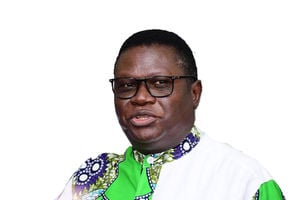UAHEB reports improved performance in 2024 Allied health exams

L-R: UAHEB executive secretary Joseph Agondua, board chairperson Rose Nassali and MoES Allied Health Division head Dr Paul Kasigaire attend the briefing of invigilators in Kampala on November 25, 2023, ahead of December 2023 UAHEB examinations. PHOTO/MIKE SSEBALU
What you need to know:
While presenting the 16th series of final semester examination results at the UAHEB office in Kyambogo, Kampala, yesterday, the board’s executive secretary, Mr Joseph Agondua, attributed the performance to the improved teaching and provision of instructional materials
The Uganda Allied Health Examinations Board (UAHEB) has noted an overall improvement in the performance of candidates in the June 2024 final exams.
While presenting the 16th series of final semester examination results at the UAHEB office in Kyambogo, Kampala, yesterday, the board’s executive secretary, Mr Joseph Agondua, attributed the performance to the improved teaching and provision of instructional materials.
A total of 16,931 candidates were assessed of which 931 were finalists while 16,000 were continuing students. The two groups sat for separate exams but at the same time.
“In June 2024 exams, a total of 805 (86.5 percent) candidates passed out of the total 931 assessed compared to the 60,016 (82.8 percent) candidates who passed out of the 7,376 assessed in the previous semester of November to December 2023 examinations,” he said.
A total of 504 (86.7 percent) out of 581 male finalists assessed passed and 301 (86.0 percent) out of 350 female finalists assessed passed.
Another 126 finalist candidates have retakes.
Examinations were held for 18 Allied Health Training programmes for the finalists, categorised into four higher diploma programmes, 10 diploma programmes, and four certificate programmes, across 61 examination centres nationwide.
“The results and recommendations of the continuing students were released by the board to the institutions. So, in this release, we shall be addressing ourselves to the results of the final semester candidates,” a statement released yesterday by UAHEB read in part.
Mr Agondua expressed concern with the enrollment in the higher diploma programmes, which has remained low with the exception of the health leadership and management.
For the diploma programmes, 299 candidates were assessed, and 290 (97 percent) passed.
For certificate programmes, 547 finalist candidates were assessed and 377 (68.9 percent) passed.
Measures
The Minister of State for Higher Education, Dr John Chrysostom Muyingo, who represented the Minister of Education and Sports, Ms Janet Museveni, said the ministry has started taking measures to address the small number of candidates enrolling for higher diploma programmes.
“The Ministry of Education and Sports is already addressing it together with other issues affecting the education and training of health workers,” he said.
He added: “The National Education and Training for Health Policy where all these issues have been captured is already before Cabinet and very soon Cabinet will be addressing itself before we share it with the public.”
Earlier, the chairperson of the board, Ms Rose Nassali, asked the ministry to address the issue of budget cuts and delayed release of funds, lift the ban on the recruitment of staff pending merger in addition to reviewing all Allied Health training curricula to meet the current demands of the world of work among others.
The commissioner of Health Education and Training, Dr Safinah Kisu, who represented the permanent secretary, Dr Jane Egau Okou, said the ministry has already revised 12 Allied Health Training Curricula but many others are still pending.
“We have 49 Curricula that need to be revised but out of those we have only worked on 12, so we still have a lot of work to revise all the rest, “she said
The Minister of State for Primary Education, Ms Joyce Kaducu, reiterated the need for the ministry to try to improve on the foundation at primary, especially in science subjects for female students.
She said this will increase the number of female candidates who do science courses with the current number less than that of boys doing science subjects at higher levels.



